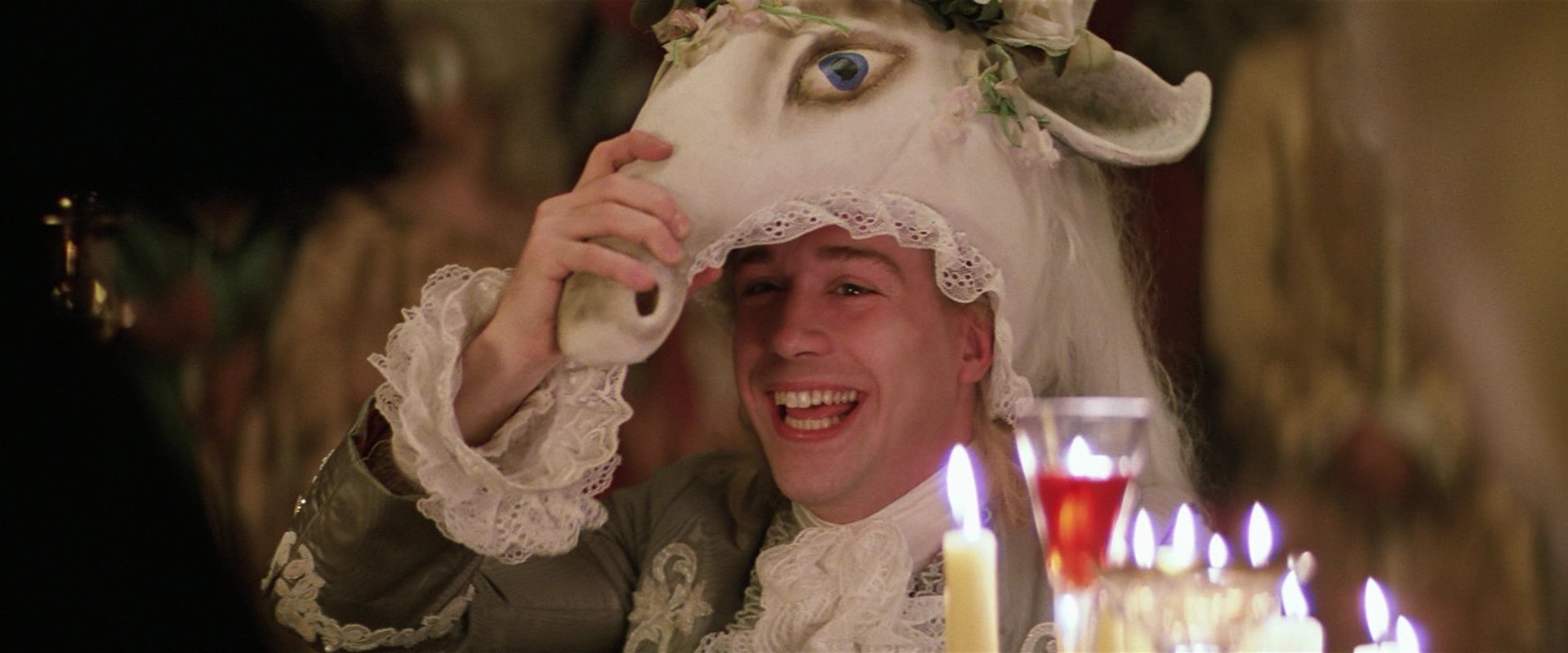
The question is pointless, I know that. Mozart, just like any other man, is a product of coincidences, social conventions and choices in a constant interaction with the chaotic system of the brain.
Every man is born only once. You can’t clone chaos.
~~
The only certainty is that Johannes Chrysostomus Wolfgangus Theophilus Mozart was not normal. Stendhal, in his monograph about Mozart, wrote that he was acting like a retarded. Since he was a child, when he wasn’t playing music he was doing constantly compulsive and repetitive motions with his hands, feet and body. He couldn’t stand still for a single moment.
Moreover, he couldn’t do simple, ordinary things like cutting the meat on his plate on his own. His hands, these magical hands, did not obey him.
He was monomaniac and maniac with everything he laid his hands on. Once he learned how to write, there were words and letters on every piece of furniture and wall. But when he started taking music lessons when he was only three years old he desisted from every other activity.
~~
He was extremely sensitive and hypochondriac – just like every natural sickly person.
Stendhal mentioned that he was constantly asking his relatives and friends if they loved him. If somebody, for kicks, said that they didn’t, he was starting to cry. He had difficulty in perceiving the others’ feelings as they were reflecting on their faces.
When he grew up and until the end he was incapable of behaving according to the rules. His temper was always close to the surface but he got over it just as suddenly, as if nothing had happened (like children do). He was talking to the Emperor as if he were a childhood friend.
He couldn’t handle his financial affairs, nor could he discern the scammers. Because of this (and also of his boundless generosity) earned very few money from his works, although he was the most famous composer – along with Franz Haydn.
That’s why he was buried in a pauper’s grave, since he was destitute.
~~{}~~
The way his brain perceived the sounds and the harmonies was equally enigmatic.
He couldn’t, for instance, hear the trumpet separately from the rest orchestra. He got hot and cold when he sighted it.
Some time, wrote Stendhal, his father made a stab at helping him to overcome his phobia. He locked him in a room and began playing trumpet. Amadeus fell screaming on the floor, plugging his ears. Just before his body went into spasm, his father ceased playing.
~~
His musical memory was not just divine, but almost devilish. There were many people who believe that this Mozart-kid got his superpowers by a –magical – ring he always wore.
When he was three years old, he began playing the harpsichord (the ancestor of the piano). Pretty soon, he could memorize a minuet within half an hour. For longer compositions, an hour would suffice.
When he was five year old, he wrote his first composition. He produced it to his father and his friends who were all musicians. Initially, they laughed with this scribble.
But when they took a closer look they realized that the five-year-old had written a proper composition, according to the rules of harmony. The only defect? It was so densely written, that no one could play it.
Maybe Amadeus would write music for angels and demons!
~~{}~~
Another episode of his childhood years, one of the most widely known, is the one with the second violin.
His father and his famous friends began to work on a new composition. After taking a look at the score, Amadeus asked if he could play the second violin.
His father refused. He had never taken violin lessons, so how could he…
His friends, for the sake of fun, went with this and therefore a violin was given to the kid with an added instruction to play quietly so that he wouldn’t disturb the others.
“A few minutes later”, recites the man who was playing the first violin “I figured out that I was totally unnecessary. The little Amadeus, who didn’t know to play the violin, had covered my parts”.
There’s more to the story. For kicks, they told the kid to play the first violin, too. In the beginning they were laughing at his unorthodox fingerings and the way he was holding the bow.
Then their eyes were covered in tears, especially his father’s. The child who had never taken violin lessons could play prima vista flawlessly such an intricate song.
They were in tears…What else could you do, if you find yourself face-to-face with God so unexpectedly?
~~{}~~
There are many other stories like this one which illustrate the fact that Amadeus was not just a wonder kid, he was the definition of musical genius.
Just like the twelve-year old Jesus at the temple, likewise, the eight-year old Mozart did a miracle that was heard across Europe, the miracle of Cappella Sistina.
During the Holy Week, Miserere was performed twice at Cappella Sistina. It was written two centuries before Mozart by Gregorio Allegri. Only the pope possessed the manuscript of this piece.
The strange thing was that the way the melody had evolved during two centuries could not be depicted with notes and definitely not with the notes of the original score.
It was a work for 36 voices and the only way to sing it as it was sang at Cappella Sistina was to join the choir and practice for many years.
In essence, only 36 people knew Miserere. Not even the Pope.
~~
On Holy Wednesday, the eight-year-old Mozart found himself in Cappella Sistina. When he got out, he wrote down all 36 voices.
No one believed his father when he announced that Miserere was in his hands and it was his eight-year-old son who had written them from memory. Show us what you’ve got, they told him.
Amadeus, who had a wonderful voice, sang –from memory, once more- before the arch-musician of the Vatican all the parts of Miserere.
“And then everybody fell on their knees in prostration”.
~~{}~~
If Mozart’s abilities were confined in his devilish memory, then he could be classified as savant, as one of the people with autism or Asperger syndrome who also have superhuman abilities.
But Mozart could not just remember the sounds. He was Μusic itself incarnated.
His compositions are so naturally perfect that you can’t help yourself wondering what better God could come up with.
The experts and the doyens, the connoisseurs and the critics may prefer Bach, Mahler and Shostakovich.
Mozart is not as titanic as Beethoven, he is not as divine as Bach, extravagant as Wagner or trailblazing as Schönberg. He didn’t break new ground, nor did he spend ten years to compose a symphony – be it the Ninth.
Mozart was a child that was playing.
Stendhal also mentions this in his monograph, in order to describe Mozart’s character: “He was always a child, as if he never grew up”.
That’s the majesty of his music. It’s the music of a child, of a child loved by God and adored by people but died destitute at 33.
All it takes is to listen to the first part of Eine kleine Nachtmusik and you’ll see for yourselves.
~~{}~~
Some –controversial- studies conducted on Mozart’s work the last years, showed the following finding:
Many of his compositions are based on the Fibonacci numbers. This sequence (1, 1, 2, 3, 5, 8, 13, 21, 34 – every new number is the sum of the preceding two ones) is also called “the numbers of life”.
It’s ever-present in the universe. From the spiral galaxies and hurricanes to the ram’s horns, the shell of a snail, the way that the seeds of a helianthus grow, the petals of a flower.
I don’t know if it’s true, but it sounds enticing to me and it doesn’t strike me as weird.
Mozart was making music just like a snail that makes its shell: unpretentiously, unfeignedly, naturally.
And as you can’t remove the shell from a snail without killing it, the same goes for Mozart.
Music was part of him and he was Music.
~~{}~~
A lot of the material came from Stendhal’s monograph “Mozart”, the writer who wrote among other the emblematic “The Red and the Black”. His epitaph reads: ”He lived. He wrote. He loved.’
What else would somebody want?
Avanti maestro, nostalgia for life, creativity and love.
~~~~~~~~~~~~~~~~~~~~~~~~~~~~~~~~~~~~~~~~~~~~~~~~~~~~~~~~
PS: An elucidation by Yannis Gutmann
Allegri’s Miserere is a piece for nine voices (one choir of five voices and another with four), namely it consists of nine independent melodies and it can be sung by 9, or 36 or even 900 singers. This means that when Mozart came out, he wrote 9 voices and not 36, without meaning that what he did was something easy. In any case, this is not a unique ability, unlike his compositions.
Sanejoker’s Facebook page:
https://www.facebook.com/sanejoker/
Translated by Alexandros Mantas
https://open.spotify.com/track/6mmhQSabF3QM2NFcUmmRCF?si=17aebee130fc44a4








